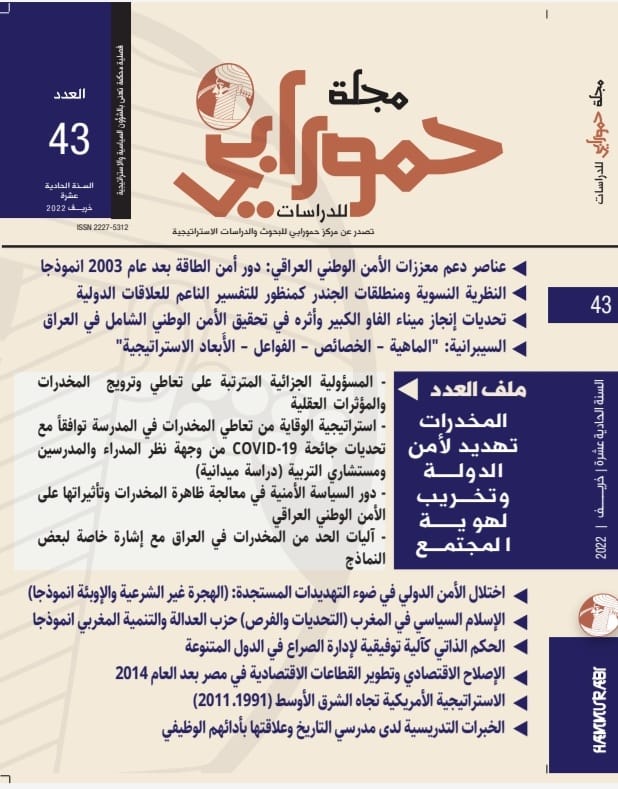Abstract
The spread of drugs and psychotropic substances in recent times is considered one of the common problems in developing and developed societies alike. It is also considered one of the most dangerous afflictions of the times، which has religious، health، social and psychological effects on members of society، which requires concerted efforts to confront and punish and limit them. Hence، attention came to it not only locally، but also internationally
The situation that Iraq witnessed during 2003 and the accompanying dangerous security chaos، the absence of government control، the failure of the security services to carry out inspection tasks at border passes، the failure of the anti-drug agencies to carry out the duties entrusted to it، as well as the dwindling of control and prevention efforts، all these factors paved the way for the scourge of narcotics and psychotropic substances، with all their ugliness، to affect Iraqi society.
This situation has led to the diversion and spread of narcotics and psychotropic substances and their trade in the local and international markets، and consequently their arrival to drug users and addicts by virtue of the social، economic or psychological conditions that surround them in light of reducing the punishment for them.
In the Narcotics and Psychotropic Substances Law No. 50 of 2017، the Iraqi legislator followed the tabular system method in determining the narcotic substances that the law criminalizes dealing with in violation of the law، and did not set a minimum limit for the quantity of narcotic substance، as the crime is committed no matter how small the amount of the narcotic substance as long as it has a tangible material that could be estimated، so it would have been more appropriate for the Iraqi legislator to increase the value of the fine stipulated in Article (32) of the above drug law in order to be a deterrent to drug users.
The situation that Iraq witnessed during 2003 and the accompanying dangerous security chaos، the absence of government control، the failure of the security services to carry out inspection tasks at border passes، the failure of the anti-drug agencies to carry out the duties entrusted to it، as well as the dwindling of control and prevention efforts، all these factors paved the way for the scourge of narcotics and psychotropic substances، with all their ugliness، to affect Iraqi society.
This situation has led to the diversion and spread of narcotics and psychotropic substances and their trade in the local and international markets، and consequently their arrival to drug users and addicts by virtue of the social، economic or psychological conditions that surround them in light of reducing the punishment for them.
In the Narcotics and Psychotropic Substances Law No. 50 of 2017، the Iraqi legislator followed the tabular system method in determining the narcotic substances that the law criminalizes dealing with in violation of the law، and did not set a minimum limit for the quantity of narcotic substance، as the crime is committed no matter how small the amount of the narcotic substance as long as it has a tangible material that could be estimated، so it would have been more appropriate for the Iraqi legislator to increase the value of the fine stipulated in Article (32) of the above drug law in order to be a deterrent to drug users.
Keywords
(narcotics، abuse، psychotropic substances)
Abstract
يُعدُّ انتشار المخدرات في الآونة الأخيرة من المشاكل الشائعة في المجتمعات النامية والمتقدمة على حدٍ سواء، كما تعدُّ من آفات العصر الخطيرة، نظراً للآثار التي تتركها على الفرد والمجتمع، الأمر الذي يتطلب تظافر الجهود للقضاء عليها والحيلولة دون انتشارها، ومن هنا جاء الاهتمام بها ليس على الصعيد الداخلي فحسب، بل على المستوى الدولي كذلك.
فقد صاحب الوضع الذي شهدهُ العراق في عام 2003 وما رافقهُ من انفلات أمني وتغيّب الاجهزة الأمنية وعدم قيامها بمهامها وواجباتها الموكلة إليها بموجب القانون على الوجه الأمثل، وتضائل الجهود في مجال مكافحة ومنع انتشار المخدرات والمؤثرات العقلية في العراق، وبالتالي وصولها ليد المدمنين والمتعاطين بسبب الظروف المحيطة بهم.
وإن المشرع العراقي في قانون رقم (50) لسنة 2017 حصَرَ المواد المخدرة في جداول مُلحقة بالقانون، وعدَّ التعامل بها جريمة بغض النظر عن حجم وكمية تلك المادة، إذ إنَّ الجريمة تُعد قائمة حتى لو كانت كمية المواد المخدرة المستخدمة قليلة جداً، لذا ينبغي على المشرع العراقي إعادة النظر في أحكام التجريم الواردة في القانون بما يضمن زيادة قيمة الغرامة الوارد ذكرها في أحكام المادة (32) من قانون المخدرات والمؤثرات العقلية لتكون عقوبة رادعة لمن تسوّل له نفسه سلوك هذا المسلك.
فقد صاحب الوضع الذي شهدهُ العراق في عام 2003 وما رافقهُ من انفلات أمني وتغيّب الاجهزة الأمنية وعدم قيامها بمهامها وواجباتها الموكلة إليها بموجب القانون على الوجه الأمثل، وتضائل الجهود في مجال مكافحة ومنع انتشار المخدرات والمؤثرات العقلية في العراق، وبالتالي وصولها ليد المدمنين والمتعاطين بسبب الظروف المحيطة بهم.
وإن المشرع العراقي في قانون رقم (50) لسنة 2017 حصَرَ المواد المخدرة في جداول مُلحقة بالقانون، وعدَّ التعامل بها جريمة بغض النظر عن حجم وكمية تلك المادة، إذ إنَّ الجريمة تُعد قائمة حتى لو كانت كمية المواد المخدرة المستخدمة قليلة جداً، لذا ينبغي على المشرع العراقي إعادة النظر في أحكام التجريم الواردة في القانون بما يضمن زيادة قيمة الغرامة الوارد ذكرها في أحكام المادة (32) من قانون المخدرات والمؤثرات العقلية لتكون عقوبة رادعة لمن تسوّل له نفسه سلوك هذا المسلك.
Keywords
(المخدرات، التعاطي، المؤثرات العقلية)
